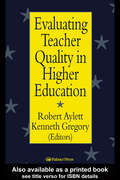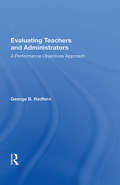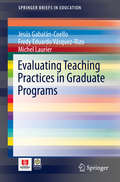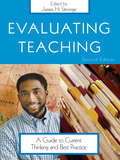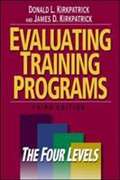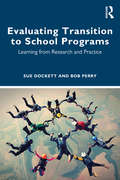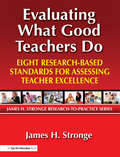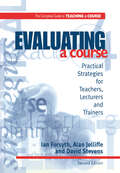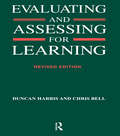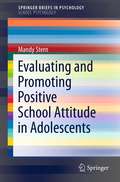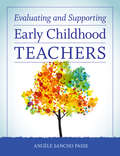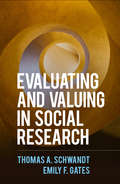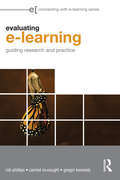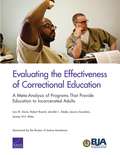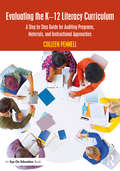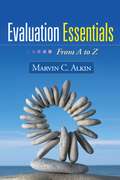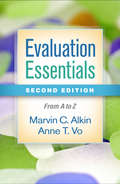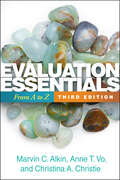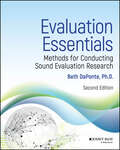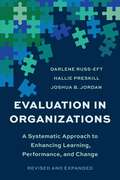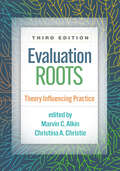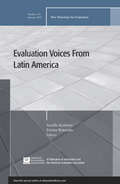- Table View
- List View
Evaluating Teacher Quality in Higher Education
by Robert Aylett Kenneth GregoryDrawing on material presented at a one day conference, this collection addresses the need to recognize academics' contributions to higher education, as well as the ways in which academics' efforts in the teaching and learning process can be acknowledged and suitably rewarded.
Evaluating Teachers And Administrators: A Performance Objectives Approach
by George B. RedfernStressing the importance of using evaluation as a means to improve teacher and administrator performance, Dr. Redfern provides a practical guide to conducting an evaluation and using its results. He thoroughly describes the anatomy of the evaluation process, outlines the materials needed, and covers such often-neglected topics as evaluation of substandard performance, assessment of the performance of administrators and supervisors, evaluation as an administrative tool in education management, and the potential pitfalls inherent in the evaluation process. The book closes with detailed suggestions for developing or revising programs for personnel evaluation.
Evaluating Teaching Practices in Graduate Programs (SpringerBriefs in Education)
by Jesús Gabalán-Coello Michel Laurier Fredy Eduardo Vásquez-RizoThis book proposes a method to evaluate the work of teachers acting in a very specific educational context: graduate programs at higher education institutions. There are many publications on the field of measurement and evaluation of teaching practices, but these studies are usually conducted at the undergraduate level and ignore the nuances of teaching practices at the graduate level. Should professors demonstrate the same skills when they teach in undergraduate programs as they do when they teach in graduate programs? Is it appropriate to use the same assessment tools both at the undergraduate and the graduate levels? Do the teaching practices evolve the same way at the graduate and undergraduate levels? The book intends to answer these questions by introducing a methodological approach to find the relevant variables that are the foundation of professional practices at the graduate level as determined by the scientific community and through the analysis of the stakeholders’ perceptions. The proposed methodological approach combines quantitative and qualitative research techniques to identify and explain, within a mixed-method framework, the most important factors that lead to teaching quality at graduate level. Therefore, How to Evaluate Teaching Practices in Graduate Practices will be a valuable resource for students, university professors and educational administrators interested in quality assurance processes in higher education institutions.
Evaluating Teaching and Learning: A practical handbook for colleges, universities and the scholarship of teaching
by David Kember Paul GinnsEvery semester, colleges and universities ask students to complete innumerable course and teaching evaluation questionnaires to evaluate the learning and teaching in courses they have taken. For many universities it is a requirement that all courses be evaluated every semester. The laudable rationale is that the feedback provided will enable instructors to improve their teaching and the curriculum, thus enhancing the quality of student learning. In spite of this there is little evidence that it does improve the quality of teaching and learning. Ratings only improve if the instruments and the presentation of results are sufficiently diagnostic to identify potential improvements and there is effective counselling. Evaluating Teaching and Learning explains how evaluation can be more effective in enhancing the quality of teaching and learning and introduces broader and more diverse forms of evaluation. This guide explains how to develop questionnaires and protocols which are valid, reliabile and diagnostic. It also contains proven instruments that have undergone appropriate testing procedures, together with a substantial item bank. The book looks at the specific national frameworks for the evaluation of teaching in use in the USA, UK and Australia. It caters for diverse methodologies, both quantitative and qualitative and offers solutions that allow evaluation at a wide range of levels: from classrooms to programmes to departments and entire institutions. With detail on all aspects of the main evaluation techniques and instruments, the authors show how effective evaluation can make use of a variety of approaches and combine them into an effective project. With a companion website which has listings of the questionnaires and item bank, this book will be of interest to those concerned with organising and conducting evaluation in a college, university, faculty or department. It will also appeal to those engaged in the scholarship of teaching and learning.
Evaluating Teaching: A Guide to Current Thinking and Best Practice
by James H. StrongeThis invaluable resource demonstrates how to foster the development of highly qualified teachers through designing and implementing a solid teacher evaluation system.
Evaluating Training Programs: The Four Levels (3rd edition)
by Donald L. Kirkpatrick James D. KirkpatrickIn this manual, the authors provide a model for evaluating training programs based on four levels: reaction, learning, behavior, and results. The book is supplemented with sample survey forms and includes actual case studies from various organizations which allow the reader to apply them to different types of training. This third edition includes a new chapter on e-learning as well as eleven new case studies. Implementing the results of the evaluations is a focus. An index is included. Annotation ©2006 Book News, Inc., Portland, OR (booknews.com)
Evaluating Transition to School Programs: Learning from Research and Practice
by Bob Perry Sue DockettTransition to school represents a time of great change for all involved. Many transition to school programs have been developed to support positive transitions to school. While these programs have involved complex planning and implementation, often they have not been evaluated in rigorous or systematic ways. This book brings together Australian and international perspectives on research and practice to explore approaches to evaluating transition to school programs. For children, school is quite different from anything else they have experienced. For families and educators, there are considerable changes as they interact with new people and take on new roles. Developing effective transition to school programs is a key policy initiative around the world, based on recognition of the importance of a positive start to school and the impact of this for future school engagement and outcomes. Throughout the chapters of this book, authors from Australia, Germany, Sweden, Ireland and Jamaica share examples of evaluation practice, with the aim of encouraging educators to reflect on their own contexts and adopt evaluation practices that are relevant and appropriate for them. The book brings together the fields of evaluation research and transition to school. A wide range of examples and figures is used to relate research and practice and to illustrate possible applications of evaluation strategies. Evaluating Transition to School Programs highlights the importance of multiple perspectives of the transition to school and offers suggestions about how the perspectives of children, families, educators and community members might be included and analysed in evaluation strategies. Other themes throughout the book include the importance of collaboration, respectful and trusting relationships, practitioner-driven inquiry, strengths-based approaches and developing programs that are responsive to context. This book is written for educators and leaders in early years and primary school settings, and will also be of interest to researchers, students and policy makers in the field.
Evaluating What Good Teachers Do: Eight Research-Based Standards for Assessing Teacher Excellence
by James StrongeThis book is based on author James H. Stronge's 20-plus years of consulting with school districts and other educational organizations in designing, piloting, and training educators in the use of teacher-performance evaluation systems. Its primary purpose is to help both teachers and their evaluators collect more comprehensive and accurate assessment data for judging teacher effectiveness. The author provides field-tested teacher-evaluation systems based on performance standards which include data collection tools and performance appraisal rubrics.
Evaluating a Course
by David Stevens Ian Forsyth Alan JolliffeThis practical guide demonstrates the place of different types of assessment in education. There are tables, charts, figures and practical tips to help make course evaluation easier. This edition includes information on using the Internet as part of a course.
Evaluating and Assessing for Learning
by Bell, Chris Harris, DuncanThis study examines the implications for evaluation and assessment when more responsibility for the learning process is given to the learner. The text includes sections on peer assessment, self-assessment, styles of evaluation, references, and the roles of teacher and learner.
Evaluating and Promoting Positive School Attitude in Adolescents
by Mandy SternAt a time when rates of depression and other mental health problems are increasing significantly among high school students, measures of school attitude and well-being are of central importance to school practitioners. Students with positive attitudes about school experience more beneficial outcomes and are also less likely to engage in maladaptive, risky behaviors. Therefore, monitoring how students feel about their experiences at school is important, and a novel, fresh approach to examining school attitude is sorely needed. Past studies of school attitude have generally focused on internal, psychological correlates of school attitude, such as individual and subjective reports of students' attitude toward school and their motivation levels. Evaluating and Promoting Positive School Attitude in Adolescents goes beyond these traditional measurements and explores less psychologically focused indicators, including ecological factors and observable behaviors. This study provides school psychologists with a new, comprehensive, and ecologically based approach with which to evaluate the school attitude of high school students.
Evaluating and Supporting Early Childhood Teachers
by Angèle Sancho PasseThere's a lot of conversation in the early childhood community on evaluating teachers to improve their performance. Raising the quality of early care and education is a priority for policymakers and practitioners on local, state, and federal levels. As a result, much attention is being focused on early childhood educators to ensure that they do a good--and better--job teaching young children. This book provides accessible information, guidance, techniques, and tools to aid directors, coaches, principals, and others leaders as they evaluate and support teachers in a way that encourages and enables them to do their best work with children.
Evaluating and Valuing in Social Research
by Thomas A. Schwandt Emily F. GatesMuch applied research takes place as if complex social problems--and evaluations of interventions to address them--can be dealt with in a purely technical way. In contrast, this groundbreaking book offers an alternative approach that incorporates sustained, systematic reflection about researchers' values, what values research promotes, how decisions about what to value are made and by whom, and how judging the value of social interventions takes place. The authors offer practical and conceptual guidance to help researchers engage meaningfully with value conflicts and refine their capacity to engage in deliberative argumentation. Pedagogical features include a detailed evaluation case, "Bridge to Practice" exercises and annotated resources in most chapters, and an end-of-book glossary.
Evaluating e-Learning: Guiding Research and Practice (Connecting with E-learning)
by Rob Phillips Carmel McNaught Gregor KennedyHow can novice e-learning researchers and postgraduate learners develop rigorous plans to study the effectiveness of technology-enhanced learning environments? How can practitioners gather and portray evidence of the impact of e-learning? How can the average educator who teaches online, without experience in evaluating emerging technologies, build on what is successful and modify what is not? By unpacking the e-learning lifecycle and focusing on learning, not technology, Evaluating e-Learning attempts to resolve some of the complexity inherent in evaluating the effectiveness of e-learning. The book presents practical advice in the form of an evaluation framework and a scaffolded approach to an e-learning research study, using divide-and-conquer techniques to reduce complexity in both design and delivery. It adapts and builds on familiar research methodology to offer a robust and accessible approach that can ensure effective evaluation of a wide range of innovative initiatives, including those covered in other books in the Connecting with e-Learning series. Readers will find this jargon-free guide is a must-have resource that provides the proper tools for evaluating e-learning practices with ease.
Evaluating the Effectiveness of Academic Development: Principles and Practice
by Lorraine StefaniHow can Academic Developers provide evidence of the effectiveness and ‘added value’ of their work to the key stakeholders within their institutions? Written for Academic Developers, academic administrators and others responsible for promoting organizational change, Evaluating the Effectiveness of Academic Development is a professional guide that shares best practice advice and provides developers with useful frameworks for effective evaluation and monitoring of their work. Through case studies and up-to-date examples from experts in the field, this collection explores the nuances of evaluative practice and the tensions inherent in claiming a causal link between academic development and organizational transformation. As higher education institutions continue to seek effective ways to determine the impact of academic development on organizational transformation in general and student learning in particular, Evaluating the Effectiveness of Academic Development is sure to be an invaluable resource.
Evaluating the Effectiveness of Correctional Education: A Meta-Analysis of Programs That Provide Education to Incarcerated Adults
by Lois M. Davis Jessica Saunders Jennifer L. Steele Jeremy N. V. Miles Robert BozickAfter conducting a comprehensive literature search, the authors undertook a meta-analysis to examine the association between correctional education and reductions in recidivism, improvements in employment after release from prison, and other outcomes. The study finds that receiving correctional education while incarcerated reduces inmates' risk of recidivating and may improve their odds of obtaining employment after release from prison.
Evaluating the K–12 Literacy Curriculum: A Step by Step Guide for Auditing Programs, Materials, and Instructional Approaches
by Colleen PennellAs your school district undertakes the process of evaluating its K–12 reading program, literacy curriculum, or literacy instructional practices, this book will be your go-to resource. Pennell offers a step-by-step guide for educators, school leaders, or professional learning communities to evaluate high-quality instructional materials and standards-aligned literacy practices. It includes a wealth of tools such as timelines, full meeting agendas, stakeholder surveys, and evaluation rubrics. Chapters cover key topics, including: Literacy leadership team meetings Reviewing foundational skills Comprehension and vocabulary Evaluating writing Selecting new materials Implementing new literacy materials Supporting educators through instructional coaching and professional learning Pennell provides a straightforward framework for how educators can work together collaboratively to analyze, reflect, and ultimately evaluate their school district’s literacy program. Each chapter is grounded in salient research on the why of literacy teaching and learning and helps you understand how instruction can be meaningfully aligned with current standards. The research and theory that support effective literacy instruction—including culturally responsive practices—are explained in an accessible and pragmatic manner. The practical tools in this book are essential for administrators and educators tasked with evaluating literacy programs and practices, as well as graduate students who must learn how to audit a literacy curriculum. Whether you’re a school administrator, teacher, or reading specialist, this book will ensure all your students can reach success in literacy.
Evaluation Essentials
by Marvin AlkinWritten in a refreshing conversational style, this text thoroughly prepares students, program administrators, and new evaluators to conduct evaluations or to use them in their work. The book's question-driven focus and clear discussions about the importance of fostering evaluation use by building collaborative relationships with stakeholders set it apart from other available texts. In 26 concise sections, Marvin C. Alkin explores how to articulate answerable evaluation questions, collect and analyze data using both quantitative and qualitative methods, and deal with contingencies that might alter the traditional sequence of an evaluation. Student-friendly features include handy bulleted recaps of each section, "Thinking Ahead" and "Next Steps" pointers, cautionary notes, annotated suggestions for further reading, and an in-depth case study that provides the basis for end-of-chapter exercises.
Evaluation Essentials, Second Edition: From A to Z
by Marvin C. Alkin Anne T. VoThoroughly revised and updated, this engaging text has given thousands of students and new evaluators the practical information and expert advice needed to conduct or use evaluations. In 26 concise sections, the book describes how to articulate answerable evaluation questions, collect and analyze data using both quantitative and qualitative methods, and deal with contingencies that might alter the traditional sequence of an evaluation. Special strengths of the text are its attention to individual, organizational, and community culture and emphasis on building collaborative relationships with stakeholders. An in-depth case study and related end-of-section exercises (including group activities) help students put themselves in the evaluator role. Other pedagogical features include section titles written as questions, bulleted recaps of each section, "Thinking Ahead" and "Next Steps" pointers, cautionary notes, and suggestions for further reading. New to This Edition *New and expanded topics: evaluation contracts, budgeting, surveys, data visualization, qualitative coding and memoing, factors affecting evaluation use, and context-sensitive evaluation. *Revised case study with extended exercises that guide the reader to complete a simulated evaluation. *End-of-section "Quick Read" links to recommended American Evaluation Association blog posts. *Four entirely new sections (such as "How Do You Strengthen Relationships with Stakeholders?" and "How Do We Plan a Process-Focused Evaluation Design?"), plus other changes and additions throughout.
Evaluation Essentials: From A to Z
by Christina A. Christie Marvin C. Alkin Anne T. VoBeloved for its conversational style and reliable advice, this text is now in a revised and updated third edition, reflecting key developments in evaluation. It includes expanded coverage of equity and social justice issues, values and cost analysis, visualizing qualitative data with software, and more. Twenty-six concise chapters, or "sessions," give students, applied researchers, and program administrators a solid foundation for conducting or using evaluations. Covering both quantitative and qualitative methods, the book emphasizes fostering evaluation use. It shows how to build collaborative relationships with users; formulate answerable evaluation questions; deal with contingencies that might alter the traditional sequence of an evaluation; and collect, analyze, and report data. Student-friendly features throughout the sessions include titles written as questions, bulleted recaps, "Thinking Ahead" and "Next Steps" pointers, cautionary notes, and annotated suggestions for further reading. An in-depth case study provides the basis for end-of-session practice exercises. New to This Edition *New sessions on context-sensitive evaluation, including the organizational, sociopolitical, and community contexts of a program. *New or expanded discussions of timely topics: identifying evaluation decision makers, analyzing program costs, coding and visualizing qualitative data with software, and more. *Updated suggestions for further reading and discussion in every chapter.
Evaluation Essentials: Methods for Conducting Sound Evaluation Research
by Beth Osborne DaPonteA nuts-and-bolts introduction to program evaluation for the nonprofit and public sectors Evaluation Essentials: Methods for Conducting Sound Research, 2nd Edition, is a substantial update to the popular overview of the evaluation process. Virtually every form of externally funded nonprofit activity must be periodically evaluated, and trained evaluators are in higher demand than ever before. This book offers a step-by-step introduction to the process and methods of program evaluation, with over 40 examples from public policy, public health, non-profit management, social work, arts management, education, international assistance, and labor. Evaluation Essentials covers updates in the field of evaluation, including contribution analyses, as well as current best practices for forming evaluation questions, applying program theory, performing literature reviews, collecting data, creating outcome measures, designing and conducting surveys, grant writing, and much more. This Second Edition also includes an expanded international context, examining evaluation in international organizations. The process outlined in this book is also applicable to policy evaluation and the evaluation of organizational performance, adding additional value to this timely update. Gain a foundational knowledge of the principles and practices of program evaluation Design evaluations and conduct research, including quantitative and qualitative analysis Generate data that can be used to demonstrate a program's impact to funders and stakeholders Learn from examples drawn from a broad range of nonprofit organizations This definitive guide to evaluation will appeal to professionals in fields as diverse as education, policy sciences, public administration, sociology, health, and beyond.
Evaluation In Organizations: A Systematic Approach To Enhancing Learning, Performance, And Change
by Darlene Russ-Eft Hallie Preskill Joshua B. JordanTake control of your resources and get the most out of your work with this helpful guide to organization and productivity From new product launches to large-scale training initiatives, organizations need the tools to measure the effectiveness of their programs, processes, and systems. In the third edition of Evaluation in Organizations, learning theory and evaluation experts Darlene Russ-Eft, Hallie Preskill, and Joshua B. Jordan integrate the most current research with practical application to provide the definitive resource on organizational evaluation for managers, human resource professionals, students, and teachers. From designing surveys and interviews to analyzing data to communicating results, the authors present a systematic and rigorous approach to conducting evaluations and using them to foster learning and enhance performance at all levels. Fully revised and updated to reflect new developments in the field, this comprehensive new edition of Evaluation in Organizations is designed to be accessible to as many different learning styles as possible.
Evaluation Of Learning
by P.N. Lakshmi ShanmugamThis self instructional material “Evaluation of Learning” provides frameworks for teachers to make evaluation successful. It explains the key concepts in assessing whether evaluation programmes actually contribute to improve quality for students. It presents clear guidelines for framing essay questions, short answer questions, multiple choice questions, true-false questions and matching questions with examples. This book focuses on construction of achievement test to judge the students mastery of skills and knowledge. It is the contribution to the challenging task and is intended to assist practitioners in strengthening evaluation and raising its importance as a core element in achieving development goa
Evaluation Roots: Theory Influencing Practice
by Christina A. Christie Marvin C. AlkinShowing how evaluation practice looks when guided by theory, the third edition of the influential "theory tree" book is significantly revised with over 80% new material, including a greater focus on equity and theories over theorists. Chapters from leading authorities describe the goals of each theory; the type of evaluation for which it is appropriate (formative, summary formative, summative, adaptive); the size of the program for which it is most applicable; specific prescriptions; and observable actions that help to define the theory. Readers are given the tools to select suitable approaches for the size, contexts and stage of an evaluation and their own personal values. New to This Edition *Chapters on culturally responsive evaluation, Indigenous evaluation, and developmental evaluation. *Organized around theories rather than individual theorists. *Increased attention to practical applications, including a chapter distilling the goals, methods, and standards of evaluations based on each theory. *Case study chapter on the role of theory in evaluation policy.
Evaluation Voices from Latin America: New Directions for Evaluation, Number 134 (J-B PE Single Issue (Program) Evaluation #109)
by Saville Kushner Emma RotondoHear from evaluation practitioners throughout Latin America. In this region program evaluation is an emergent practice, one that is shaped by distinctive geopolitical and social contexts and has its own intellectual biography. Through a selection of writings and cases this issue provides a window on program evaluation in this region. The articles indicate a range of experiences and concerns that respond to the countries’ unique histories and cultures. Articles by evaluators from Argentina, Brazil, Chile, Colombia, Costa Rica, and Peru illustrate new directions and are grouped around the following themes: Strategic use of evaluation in public policies and active citizenship Innovative project evaluation examples Evaluation capacity building and institutionalization. The widespread development of participatory or actor-oriented approaches, based on qualitative methodologies that have a particularly Latin American stamp, are emphasized in this issue. This is the 134th volume of the Jossey-Bass quarterly report series New Directions for Evaluation, an official publication of the American Evaluation Association.
